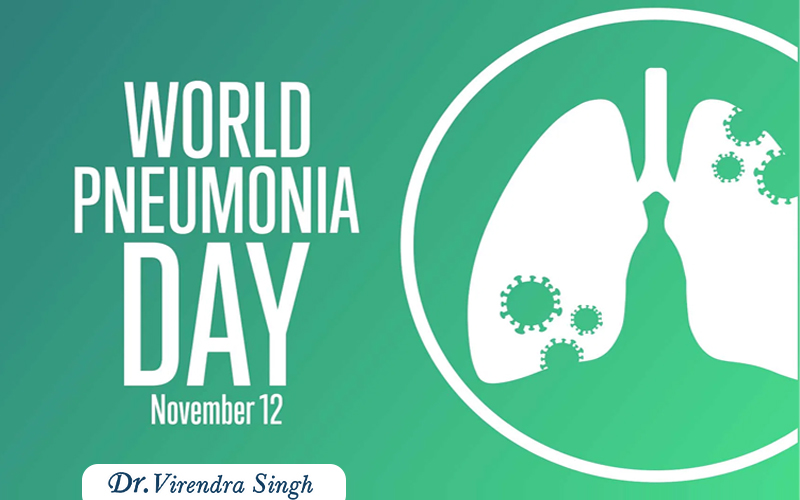
November 12 is World Pneumonia Day. As with previous years, its purpose is to raise public awareness of the need for unity and demand action in the battle against this illness. The leading infectious disease that kills both adults and children worldwide is pneumonia. On average, its death rate alone results in more children dying than the combined rates of malaria, measles, and AIDS. The lack of oxygen in the lungs emphasizes how vital oxygen is to our bodies and how vital lung health is on a global scale. This day unites communities, governments, and health organizations to increase access to prevention and treatment, increase awareness, and lessen the worldwide impact of the disease.
On this World Pneumonia Day, Dr. Virendra Singh, a distinguished pulmonologist and respiratory health leader, has played a pivotal role in spearheading the fight against pneumonia. He has a wealth of experience and is committed to public health, stressing the significance of early detection, efficient treatment, and prophylactic measures like immunizations to limit the severity and spread of pneumonia.
On World Pneumonia Day, Dr. Virendra Singh addresses key issues like healthcare accessibility and awareness, especially for vulnerable populations such as young children and the elderly. He supports a comprehensive strategy that lowers the risk of respiratory infections by promoting improved cleanliness, educating communities about the signs of pneumonia, and enhancing air quality.
COPD Specialist, Asthma Specialist, ILD Lung Specialist, Sleep Apnea Specialist
The Theme for World Pneumonia Day 2024
The theme for World Pneumonia Day 2024 is “Championing the fight to stop pneumonia”.
History of Pneumonia Day
The Global Coalition against Child Pneumonia commemorated the first World Pneumonia Day in 2009. Their objectives were to increase the general public’s understanding of the seriousness of pneumonia and to collaborate to bring this frequently disregarded sickness to the attention of the world community. “Healthy Lungs for Everyone” served as the day’s overarching theme and has been since the inaugural World Pneumonia Day in 2009. The phrase was broadened to include additional campaign-related terms, such as offering sufficient protection against the illness and making treatment facilities accessible to individuals who are affected.
About 1.2 million children died from pneumonia in the year that the inaugural World Pneumonia Day was marked.
This day was first celebrated globally and internationally in 2013, four years after WHO and UNICEF unveiled an Integrated Global Action Plan for the Prevention and Control of Pneumonia and Diarrhea. Over the next four years, the “Every Breath Counts” campaign established the first public-private partnership to help governments implement the Global Action Plan for Pneumonia and Diarrhea (G.A.P.P.D.) in an effort to gain as much control over the diseases as possible.
World Pneumonia Day Timeline
- Late 1800s and Early 1900s: Pneumonia is the third leading cause of death, with the winter flu being the most frequent infectious disease-related cause of death overall.
- 1913:The introduction of the first pneumonia drug reduces the mortality rate from 2.5 percent to 7.5 percent. This is the first novel treatment for pneumonia.
- 1930: Winston Churchill’s bacterial pneumonia was treated. Sulfapyridine, the first antibacterial drug, is developed and used to treat Winston Churchill’s bacterial pneumonia.
- 1977: The first bacterial pneumonia vaccination. Although the vaccine only protected a tiny percentage of the disease’s causes, it did open the door for the introduction of a second vaccination in 2000, which prevented most of the disease’s types.
The Need for Early Detection
Seeking prompt medical attention depends on the early identification of these symptoms. If pneumonia is not treated, it can have serious effects, including respiratory collapse, therefore prompt medical attention is essential.
Preventive Actions:
There are several steps involved in preventing pneumonia:
- Vaccination: Pneumonia risk is significantly reduced by vaccination, especially when paired with the flu and pneumonia vaccines.
- Hygienic Habits: Frequent hand washing, avoiding direct contact with sick people, and practicing excellent respiratory hygiene can all help stop the spread of infections.
- Healthy Lifestyle: Immune system support from a balanced diet, frequent exercise, and enough sleep reduces the chance of illness.
Raising Awareness on World Pneumonia Day
Since winter is quickly approaching and the weather is unfavorable, many of us are more vulnerable to the flu and the common cold. Serious respiratory diseases like pneumonia are more common in the elderly and in children under the age of two, who are particularly at risk. Pneumonia is a lung infection caused by viruses, bacteria, or fungi resulting in inflammation of the air sacs with fluid thereby causing shortness of breath. It may endanger your life. Hospitalization may also be necessary after receiving a diagnosis of such an illness. But you should be concerned about your treatment or the subsequent expenses. On this World Pneumonia Day, we give you some important information regarding this sickness and how a full insurance policy will make it easier for you to get well.
Notable Signs to Keep on:
- Persistent Cough: A prolonged cough, which may produce yellow mucus, is one of the primary symptoms of pneumonia.
- Fever and Chills: Severe fever coupled with chills, and excessive sweating, suggest the possibility of an infection.
- Respiratory Problems: Breathlessness, particularly when performing daily tasks, may be a sign of pneumonia-related respiratory issues.
- Chest Pain: Chest pain when coughing or deep breathing, which can vary from mild discomfort to excruciating pain, may be a sign of a more serious problem.
- Exhaustion and Weakness: The symptoms of pneumonia can include a broad feeling of weakness and excessive fatigue.
- Gastrointestinal Symptoms: Occasionally, pneumonia may be accompanied by vomiting, nausea, or diarrhea.
- Confusion in the Elderly: Elderly folks or those with weakened immune systems may experience disorientation or diminished mental awareness due to low oxygen levels.
- Symptoms Particular to Children: Children may have fast breathing, trouble eating, bluish skin, or excessive lethargy, all of which call for prompt medical intervention.
FAQs
What is World Pneumonia Day?
World Pneumonia Day, honored on November 12, encourages efforts to lessen the global burden of pneumonia, a preventable yet fatal illness.
What is the Theme for World Pneumonia Day 2024?
The Theme for World Pneumonia Day 2024 is “Championing the fight to stop pneumonia”.
Who is most vulnerable to pneumonia?
Young children, older adults, and people with weakened immune systems or chronic illnesses are most at risk.
How is pneumonia prevented?
Vaccines, proper hygiene, clean air, and a healthy diet can all help avoid pneumonia.
What are the main causes of pneumonia?
The flu, RSV, and pneumococcal bacteria are frequent causes of pneumonia, which is mostly caused by bacteria, viruses, and fungi.
Why is pneumonia awareness important?
By encouraging early diagnosis, treatment, and prevention—particularly in high-risk populations—pneumonia awareness contributes to lifesaving.
